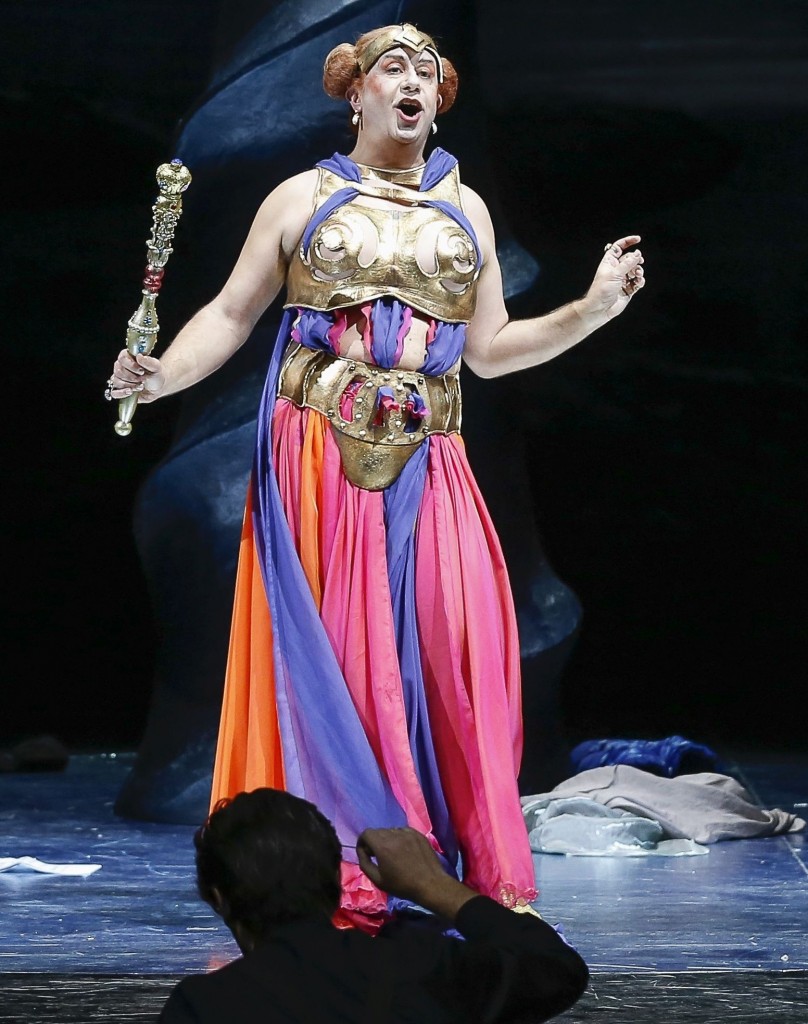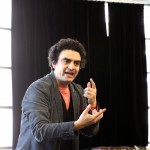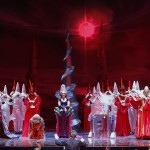 Donizetti’s comedy opera , is a ‘Noises Off’, an opera within an opera: a send-up of an operatic rehearsal in a provincial theatre, where they’re playing some obscure Italian opera. Behind the scenes , there’s every operatic stereotype: the diva Corilla, who disagrees with the director; a tussle between a mezzo and soprano over a role; a Russian tenor, who doesn’t understand Italian. And there’s La Mamma , Agata, who bullies the producer to get her daughter Luisa on stage; and herself takes over the vacant part of Queen. It’s a brilliant spoof, wittily conceived and composed by one of the great opera composers of his time, who had the wit to send up his profession. To add to the dramatic irony, Vienna Volksoper’s director is Rolando Villazón, no less, but not in a singing role.
Donizetti’s comedy opera , is a ‘Noises Off’, an opera within an opera: a send-up of an operatic rehearsal in a provincial theatre, where they’re playing some obscure Italian opera. Behind the scenes , there’s every operatic stereotype: the diva Corilla, who disagrees with the director; a tussle between a mezzo and soprano over a role; a Russian tenor, who doesn’t understand Italian. And there’s La Mamma , Agata, who bullies the producer to get her daughter Luisa on stage; and herself takes over the vacant part of Queen. It’s a brilliant spoof, wittily conceived and composed by one of the great opera composers of his time, who had the wit to send up his profession. To add to the dramatic irony, Vienna Volksoper’s director is Rolando Villazón, no less, but not in a singing role.
Donizetti’s 1827 Le convenienze ed inconvenienze teatrili (Theatrical customs: good and bad) is now a post-modern production. In Vienna Volksoper’s cleverly designed set (Friedrich Despalmes), there’s a stage within a stage: even its own orchestral pit at the front. The smaller stage revolves, so we even see pinball players ‘behind the scenes’. The ‘director’ and ‘conductor’ are constantly stepping onto the stage to direct their singers.) The prima donna Corilla (Rebecca Nelsen) is of course in a bright pink top. The stage cast are fantastically dressed, as if out of a sci-fi pantomime , some in pointed hats , some in silver. There’s a photographer, forever taking shots of the cast ‘on stage’ . (Why would he bother?) The ‘conductor’ is slumped asleep on the score. The ‘Russian’ tenor, (who speaks no Italian) , is played by Korean JunHo You. A voice coach is giving him lessons (in German); and we hear more of JunHo You’s superb tenor.
Now a sensation. ‘Mamma’, a figure in drag- traditional Austrian ‘Tracht‘, and bright orange hair- explodes onto the stage. ‘What’s with the rondo?’ If Luisa (her daughter ) doesn’t sing , the whole city will revolt. The shock is the voice: Martin Winkler’s baritone, with its deep timbre, is phenomenal. ‘She’ runs amok in the director’s space, and even pinches the (‘rehearsal’) conductor’s bottom. Then Mamma climbs onto the stage arguing with the director, fighting her daughter’s case. Luisa needs encouraging. Mara Mastalir appears an anaemic, meek blonde girl, wearing a violet pinafore like her mother’s. But Luisa’s voice will grow in confidence, Mastalir’s soprano getting better and better.
There’s wonderful camp as Mamma confronts Corilla, the prima donna, whom she exposes as formerly a mere chorister, and the wife of a chestnut seller. Stefano, (Ben Connor in a slick silver-grey suit), is now both her husband and agent. He gives a resumé of Corilla’s ‘glorious career’, Mamma interrupting with guffaws and yawns. He will defend his wife whatever, and tips Mamma’s armchair over. Agata, Winkler in that outrageous Alpine outfit, lays into Corilla: her father had a market stall, no wonder she’s so arrogant. In a slagging match, Corilla threatens to pull Mamma’s hair out; Winkler retaliates, she’ll strangle her with her wig.
As well as the high camp, Winkler treats us to some splendid singing: her aria, ‘O God give me a moment’, then her plea to the theatre manager (Wilfried Zelinka). Desperate after the mezzo walks out, he casts Agata in the vacant role of Queen. There’s chaos as the tenor also walks out (and Stefano is cast as ‘Romulus’, although he’s a baritone.) And in this spoof on putting on a show, the theatre manager has money problems, so they all demand an advance.
Ironically, in the opera, they all complain about the production. But Vienna Volksoper’s production, directed by Rolando Villazón, also becomes increasingly incoherent. The director’s task should be to help the audience understand the piece, not confuse them. Villazón (in an interview) rightly argues the Romulus and Ersilia piece is not to be taken seriously. But he also hints at Donizetti’s more serious themes, so he surely doesn’t intend an outright farce. The director in Viva La Mamma wanted the Romulus piece played a thousand years in the future, Villazón argues . ‘Naturally there are some problems.’
 The Act 2 sets are a mix of Star Wars and pantomime. But, cleverly lit , it looks expensive. The soprano (Rebecca Nelsen) is interrupted by a Star Wars R2-D2 robot . (‘That is a duet’, insists the Director!) Nelsen rushes off in a pique. She returns, singing Ersilia’s aria, ‘This is the day of joy. Flee to me.’ Then Mamma drags the diva off stage and stops up her mouth. In spite of the farce- the two sopranos Luisa and Corilla in a standoff- Donizetti’s music somehow prevails, seriously and beautifully sung by Volksoper Chorus, the Vienna Volksoper Orchestra (conductor Wolfram-Maria Märtig) sustaining a Rossini-like rhythmic vitality.
The Act 2 sets are a mix of Star Wars and pantomime. But, cleverly lit , it looks expensive. The soprano (Rebecca Nelsen) is interrupted by a Star Wars R2-D2 robot . (‘That is a duet’, insists the Director!) Nelsen rushes off in a pique. She returns, singing Ersilia’s aria, ‘This is the day of joy. Flee to me.’ Then Mamma drags the diva off stage and stops up her mouth. In spite of the farce- the two sopranos Luisa and Corilla in a standoff- Donizetti’s music somehow prevails, seriously and beautifully sung by Volksoper Chorus, the Vienna Volksoper Orchestra (conductor Wolfram-Maria Märtig) sustaining a Rossini-like rhythmic vitality.
There are also stand-out arias. Mamma’s, Winkler expressive and moving, that a professional artist has to sing about his wage. Then when Mamma negotiates with the theatre director (Zelinka). Let her sing just once, she pleads. (She promises to pawn her jewellery to prevent the production from folding.) She will sing! Viva la Mamma, Viva la Mamma! Agata, Zelinka realises , is irreplaceable. ( And she can hardly wait for what her daughter will achieve.)
Then, totally unexpected, against a darkened, hushed stage, the tenor (JunHo You), with a suitcase, launches into the most moving aria. He follows her like a rainbow, a friendly jackal… Sung with self-effacing sincerity, it reminds of Nemorino’s more famous aria in L’elisir d’amore. Quite outstanding.
Also memorable, Mara Mastalir, her soprano now at full range. ‘Oh, don’t neglect me, trust in your daughter,’ surprisingly well sung, her coloratura impressive.
There’s also a superbly staged ballet sequence, danced by Vienna State Ballet dancers. The choreography is so precise, it’s not sabotaged by Winkler’s Mamma interrupting the proceedings. These space-age pantomime figures are like a comedy review. Then the ‘triumphal march’ in the rehearsal piece – ‘Hail great Romulus’ – takes over.
In the closing medley (should it be ensemble), some of the cast hold up placards- ‘Save our Theatre!’, ‘Money for Art!’- in an agit-prop reminder, as rehearsals continue, of funding cuts and subsidies in the everyday life of an opera company. But, thanks to Agata, finances are secured just before the premiere, hence the Viva la Mamma! festive finale.
Of Vienna Volksoper’s production: a lot of money has been expended on these outrageous, but ridiculously silly, costumes . Also included in the line up, two ‘Star Wars icons’ (there’s a Chewbacca-like ape)- a gimmick conveniently coinciding with Star Wars VII’s release. However, the Mamma figure played in drag, as Donizetti intended, couldn’t be more topical; it makes the scheme even more confusing, but this is opera buffo, and she (Winkler) truly the star.
Villazón’s intentions may be serious, but the staging is rather a mess. Donizetti’s music, his glorious score Le convenienze ed inconvenienze teatrili, however, survives. We should be grateful for that. © P.R. 4.01.2016
Photos: Agata (Martin Winkler); Rolando Villazón in a dress rehearsal; Ensemble with members of Vienna State Ballet
© Barbara Pálffy/ Volksoper Wien

We stumbled over here from a different web page
and thought I may as well check things out.
I like what I see so i am just following you. Look forward to looking at your web
page again.